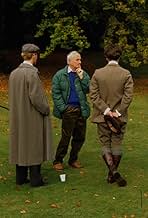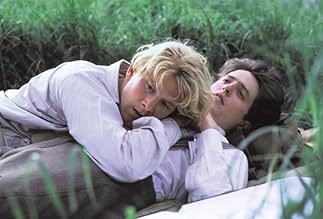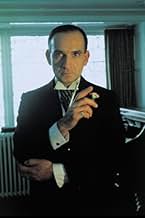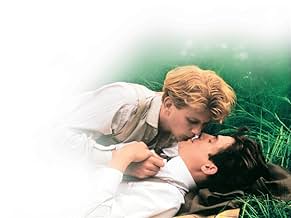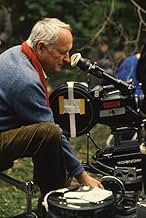Depois que seu amante o rejeita, um jovem preso pela opressão da sociedade eduardiana tenta chegar a um acordo e aceitar sua sexualidade.Depois que seu amante o rejeita, um jovem preso pela opressão da sociedade eduardiana tenta chegar a um acordo e aceitar sua sexualidade.Depois que seu amante o rejeita, um jovem preso pela opressão da sociedade eduardiana tenta chegar a um acordo e aceitar sua sexualidade.
- Direção
- Roteiristas
- Artistas
- Indicado a 1 Oscar
- 3 vitórias e 2 indicações no total
- Direção
- Roteiristas
- Elenco e equipe completos
- Produção, bilheteria e muito mais no IMDbPro
Avaliações em destaque
A gay classic that is situated at the beginning of the twentieth century. 'Maurice' is the story of Maurice Hall, a student at the University of Cambridge, United Kingdom. There he meets Clive Durham. Both men develop a strong friendship, which to a certain level, becomes physical. Clive is gay, but Maurice doesn't want to know anything about it. Until he admits he also has feelings for persons of the same sex, even though in intellectual circles homosexuality is 'the love that dare not speak its name'.
Maurice doesn't know how to behave. Of course he wants to be himself, but society doesn't accept gay people. When he more or less decides to live as a gay man bosom friend Clive changes his mind, frightened by a lawsuit against a gay man. According to Clive the physical friendship between Maurice and Clive must end and from that moment on he wants to experience real love: the love of a woman. The relation between Maurice and Clive gets tense.
Even Maurice tries to get his sexual preference changed by visiting a hypnotist, but the treatment fails. That becomes very clear when Maurice sleeps with Scudder, Clive's under gamekeeper. A passionate love develops between Scudder and Maurice, which makes Clive realize what kind of appearance he has to keep up as a 'converted' gay man.
'Maurice' is based on the novel of the same name written by E.M. Forster. The film is beautiful and made with a feeling for historical notion. The actors playing the leading roles are straight in real life but act the gay roles in a beautiful way. Actually everything in the film is right: image, usage of language, costumes and music.
Maurice doesn't know how to behave. Of course he wants to be himself, but society doesn't accept gay people. When he more or less decides to live as a gay man bosom friend Clive changes his mind, frightened by a lawsuit against a gay man. According to Clive the physical friendship between Maurice and Clive must end and from that moment on he wants to experience real love: the love of a woman. The relation between Maurice and Clive gets tense.
Even Maurice tries to get his sexual preference changed by visiting a hypnotist, but the treatment fails. That becomes very clear when Maurice sleeps with Scudder, Clive's under gamekeeper. A passionate love develops between Scudder and Maurice, which makes Clive realize what kind of appearance he has to keep up as a 'converted' gay man.
'Maurice' is based on the novel of the same name written by E.M. Forster. The film is beautiful and made with a feeling for historical notion. The actors playing the leading roles are straight in real life but act the gay roles in a beautiful way. Actually everything in the film is right: image, usage of language, costumes and music.
I saw MAURICE when it first appeared in theaters in the mid-80s and enjoyed it. I was surprised on a second viewing on DVD last night at how much I had forgotten about this film. This story of a thwarted love affair between two upper- class men during their years at Cambridge is a deeply absorbing and entertaining adaptation of Forster's posthumously published novel, which I read at in 1971. I thought the book rather dull. The movie seems anything but, which makes me wonder if I shouldn't pull it off my library shelves and give it another go.
Though James Wilby's Maurice Hall is the main character, it is Hugh Grant young aristocrat that is most intriguing here. Clive Durham (Grant) is a spoiled and deeply entrenched member of Britain's snobbish ruling class. It is Durham who pursues Wilby (not the other way around as some of these reviews would have you believe). Initially spooked by Durham's admission of his love for Maurice, he pursues Durham with a naive passion. But that passion is ruined when a fellow classmate from Cambridge is set up by a soldier in a bar and arrested by the police. This young man's future in politics and society is ruined (horrified, Durham says no to him when he asks to testify on his behalf), and he is found guilty and sentenced to six months in jail and hard labor. His picture is splashed across the headlines of London's tabloids. The realization that this could happen to him forces Durham to reject Maurice, pursue and marry a young girl from his class and move himself deeply into the closet. So much for the politics of homosexuality in Britain, circa 1912.
Maurice is devastated by his friend's rejection of him. Miserable, he seeks every avenue he can to reverse and cure his own homosexual longings. He even subjects himself to the quackery of a hypnotist-therapist (Ben Kinsley in a hilarious turn). Maurice finally gives in to his feelings when he finally falls deeply in love with the gamekeeper of Durham's estate (well played by the young and very handsome Rupert Graves).
This Merchant-Ivory film is, typically, gorgeous to look at, its pacing is novelistic and deeply rewarding. Hugh Grant showed early star appeal as the superficial and ultimately defeated victim of his class and society. He would rarely get the chance at so fine a part in the future despite his great success as a light comedian in a string of international hit movies (ABOUT A BOY being one such terrific film performance from this very appealing actor). James Wilby is pitch perfect as the perplexed and emotional Maurice. The expert supporting cast under the commanding direction of James Ivory delivers this period piece superbly. It's period look is typical of Merchant-Ivory productions--detailed, richly appointed and very beautiful. Kudos also to Kit Hesketh-Harvey's excellent screenplay.
One viewer here complained that ending was far too upbeat and unrealistic for its time, but I really didn't see it that way. There were many men and women who set up housekeeping in both London and New York, living their lives in discreet harmony under the noses of hostile societies. Still others preferred to move abroad to live their lives in discrete peace and tranquility. I prefer to think this is just what Maurice and Scudder do. If Maurice were as much of a snob as Durham, this might not have worked. But we see Maurice's slow understanding of the hypocrisy of his class in the aftermath of his affair with Durham, and he comes to realize that even he is somewhat constrained by his own upper-class upbringing in his initial interactions with Scudder's far lower standing.
This is a deeply affecting movie and holds up superbly. Highly recommended.
Though James Wilby's Maurice Hall is the main character, it is Hugh Grant young aristocrat that is most intriguing here. Clive Durham (Grant) is a spoiled and deeply entrenched member of Britain's snobbish ruling class. It is Durham who pursues Wilby (not the other way around as some of these reviews would have you believe). Initially spooked by Durham's admission of his love for Maurice, he pursues Durham with a naive passion. But that passion is ruined when a fellow classmate from Cambridge is set up by a soldier in a bar and arrested by the police. This young man's future in politics and society is ruined (horrified, Durham says no to him when he asks to testify on his behalf), and he is found guilty and sentenced to six months in jail and hard labor. His picture is splashed across the headlines of London's tabloids. The realization that this could happen to him forces Durham to reject Maurice, pursue and marry a young girl from his class and move himself deeply into the closet. So much for the politics of homosexuality in Britain, circa 1912.
Maurice is devastated by his friend's rejection of him. Miserable, he seeks every avenue he can to reverse and cure his own homosexual longings. He even subjects himself to the quackery of a hypnotist-therapist (Ben Kinsley in a hilarious turn). Maurice finally gives in to his feelings when he finally falls deeply in love with the gamekeeper of Durham's estate (well played by the young and very handsome Rupert Graves).
This Merchant-Ivory film is, typically, gorgeous to look at, its pacing is novelistic and deeply rewarding. Hugh Grant showed early star appeal as the superficial and ultimately defeated victim of his class and society. He would rarely get the chance at so fine a part in the future despite his great success as a light comedian in a string of international hit movies (ABOUT A BOY being one such terrific film performance from this very appealing actor). James Wilby is pitch perfect as the perplexed and emotional Maurice. The expert supporting cast under the commanding direction of James Ivory delivers this period piece superbly. It's period look is typical of Merchant-Ivory productions--detailed, richly appointed and very beautiful. Kudos also to Kit Hesketh-Harvey's excellent screenplay.
One viewer here complained that ending was far too upbeat and unrealistic for its time, but I really didn't see it that way. There were many men and women who set up housekeeping in both London and New York, living their lives in discreet harmony under the noses of hostile societies. Still others preferred to move abroad to live their lives in discrete peace and tranquility. I prefer to think this is just what Maurice and Scudder do. If Maurice were as much of a snob as Durham, this might not have worked. But we see Maurice's slow understanding of the hypocrisy of his class in the aftermath of his affair with Durham, and he comes to realize that even he is somewhat constrained by his own upper-class upbringing in his initial interactions with Scudder's far lower standing.
This is a deeply affecting movie and holds up superbly. Highly recommended.
I remember I saw this movie I was about 17. I'd read the book and fell in love. It tells a love story between two men and the way they have to carry it out despite society rules (with some changes it still happens nowadays...).
The general message would be "love conquers all" but is it really so? Are Maurice and Scudder able to live happily ever after? I doubt, and on the beginning of the XXth century it would be even worse.
Despite all, it's lovely to watch the same kind of story we're used to watching in movies that portray society in different times, but now speaking about love between men! Although James Ivory's work is beyond criticism, in my point a view, there were some scenes in the book (the one when they are in London, sitting naked by the fire, for instance) that really should be in the movie.
But it's a tender and romantic approach of of book (only published after E.M. Foster's death) that surely would have pleased it's author.
The general message would be "love conquers all" but is it really so? Are Maurice and Scudder able to live happily ever after? I doubt, and on the beginning of the XXth century it would be even worse.
Despite all, it's lovely to watch the same kind of story we're used to watching in movies that portray society in different times, but now speaking about love between men! Although James Ivory's work is beyond criticism, in my point a view, there were some scenes in the book (the one when they are in London, sitting naked by the fire, for instance) that really should be in the movie.
But it's a tender and romantic approach of of book (only published after E.M. Foster's death) that surely would have pleased it's author.
Maurice' had a deep emotional impact on me when I first saw it in my early teens, more than ten years ago. I just saw it again for the first time since then and I was a bit worried that I would be disappointed, but then I was definitely not. It still had the same magic.
To me, this is the #1 Merchant-Ivory work. I find this movie astoundingly profound compared to several other of their movies. This movie is above all accomplished by the excellent acting. It tells a pure and convincing story about struggling to be true to oneself in a world of not only prejudice and firm standards but even serious legal sanctions.
I think Maurice' is far more romantic, and sexy, than most heterosexual love stories I have seen. The love and longing of these men seems so real and pure, especially by the fact that they are consistently being told that their inclination is `unspeakable', and their futures and careers are at stake.
It is great to see Hugh Grant in an early role (his first real movie role?) that is so different from the mainstream comedy entertainer he has become. The ending is stunning. I love that the movie ended exactly where it did, although it is a dread to acknowledge that the war would break out soon after. The music score is enthralling. And Alec Scudder is so beautiful that it hurts.
To me, this is the #1 Merchant-Ivory work. I find this movie astoundingly profound compared to several other of their movies. This movie is above all accomplished by the excellent acting. It tells a pure and convincing story about struggling to be true to oneself in a world of not only prejudice and firm standards but even serious legal sanctions.
I think Maurice' is far more romantic, and sexy, than most heterosexual love stories I have seen. The love and longing of these men seems so real and pure, especially by the fact that they are consistently being told that their inclination is `unspeakable', and their futures and careers are at stake.
It is great to see Hugh Grant in an early role (his first real movie role?) that is so different from the mainstream comedy entertainer he has become. The ending is stunning. I love that the movie ended exactly where it did, although it is a dread to acknowledge that the war would break out soon after. The music score is enthralling. And Alec Scudder is so beautiful that it hurts.
Similar to goldilocks-78, I watched Maurice again - I saw it when I was in my 20s, when it was first released. There is some very good acting, and a very good sociological recreation of the Edwardian period. Maurice, the novel, might well not be considered as EM Forster's finest work. But similar to Lady Chatterley's Lover (not considered among Lawrence's best), the work raises issues of class, gender, and sexuality. The three leads are good - Hugh Grant gives a plausible portrayal of a more refined, upper-class man, who denies his homosexual urgings and marries. He clearly shows (after this conversion of sorts) his ambivalence and almost forced denial. Hugh Grant, almost effortlessly, shows the two sides to this character. James Wilby,as Maurice, moves from self-disgust, despair and guilt, to self-acceptance. Rupert Graves as Scudder (similar to Mellors) is really good. The scenes he shares with James Wilby are not forced. The supporting cast are good - the women, Simon Callow (who introduces us to the Edwardian conformist ideology) are equally good. And Ben Kingsley, as the hypnotherapist nicely shows the push-pull in the then-British psyche. My favourite Merchant-Ivory film is Room with a view. Maurice is darker, but just as well filmed, with enough humour to balance the seriousness of the film. The naive, happily-ever-after ending (EM Forster's) doesn't quite work, but leads to good discussion. Of all the DVD-shown deleted scenes, the final 'confrontation' between Maurice and Durham should be, in my opinion, restored. It's a fine film, both engaging and unsettling. Sensitively adapted, directed, acted and shot. Kudos
Você sabia?
- CuriosidadesIn the DVD extras, Hugh Grant says that because he and James Wilby already knew each other from appearing in Privileged (1982) together, they were able to practice their scenes together at Grant's house the night before Wilby's audition. Grant says that he remembers it "being a surprise to my banker brother when he came home and found me kissing James Wilby in the front room."
- Erros de gravaçãoDuring one of the earlier scenes while Maurice and others are reading/translating with a professor/dean, Maurice is seen clearly wearing a wristwatch. While wristwatches did exist at the time they were rare, and were considered working class so would not have been worn by a gentleman. The wristwatch would not become common until the first world war, when they were given to soldiers to allow them to see the time while both hands were engaged.
- Citações
Maurice Hall: I'm an unspeakable of the Oscar Wilde sort.
- Versões alternativasSome NTSC versions are scanned at 25fps and the running time is short and seems edited but the movie is intact.
- Trilhas sonorasMiserere Psalm 51
Written by Gregorio Allegri
Sung by The Choir of Kings College Cambridge
Courtesy of The Decca Record Company LTD.
Principais escolhas
Faça login para avaliar e ver a lista de recomendações personalizadas
- How long is Maurice?Fornecido pela Alexa
Detalhes
- Data de lançamento
- Países de origem
- Centrais de atendimento oficiais
- Idioma
- Também conhecido como
- Moris
- Locações de filme
- Empresas de produção
- Consulte mais créditos da empresa na IMDbPro
Bilheteria
- Orçamento
- £ 1.577.000 (estimativa)
- Faturamento bruto nos EUA e Canadá
- US$ 2.484.230
- Fim de semana de estreia nos EUA e Canadá
- US$ 49.278
- 20 de set. de 1987
- Faturamento bruto mundial
- US$ 2.643.324
- Tempo de duração2 horas 20 minutos
- Mixagem de som
- Proporção
- 1.66 : 1
Contribua para esta página
Sugerir uma alteração ou adicionar conteúdo ausente



